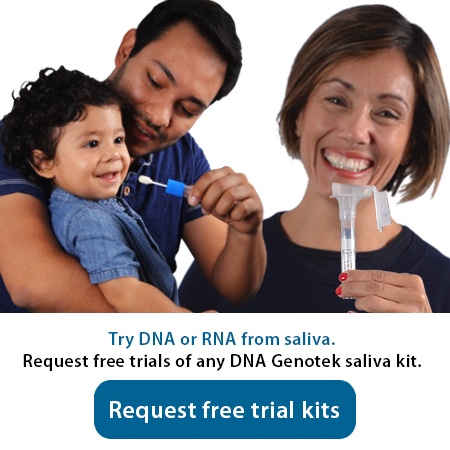2021-03-31
Project highlights presented at the Festival of Genomics 2021.
In January of this year, the 6th annual Festival of Genomics was held virtually with remarkable success featuring talks from all over the world. At this year’s conference, DNA GenotekTM was honored to host Dr. Jordan Weyer from The Mayo Clinic to discuss his involvement in the All-of-Us program – A visionary initiative whose mission is to accelerate health research and medical breakthroughs by gathering data and samples from 1 million or more individuals from the U.S.A. This initiative will enable individualized prevention, treatment, and care, while also making sure that the data security infrastructure is of the highest value and represents the latest and greatest in the industry.
In this blog, we summarize the key-highlights from Dr. Weyer’s talk. If you are interested, you can watch his entire presentation in the embedded video below.
“This is a historic longitudinal effort to gather data from 1,000,000 or more people living in the United States, and the goal is to help accelerate and improve health. We are trying to consider individual differences such as lifestyle, socioeconomics, environment, and biology to help researchers uncover paths towards delivering precision medicine or individualized prevention, treatment, and care for ‘all of us’... The program itself is really one of the foundational components to the larger Precision Medicine initiative that was launched in 2015 by then United States President, Barack Obama.” - Dr. Jordan Weyer
The All-of-Us program will be the largest, most in-depth, and diverse, biomedical resource ever, while making it easy, safe, and free to use for worldwide research.
The All-of-Us mission is to provide the opportunity to save time and resources and accelerate research breakthroughs by leveraging a rich and longitudinal dataset that will follow participants as they move, age, develop relationships, get sick, and try treatments.
“The program also has started piloting some wearable data trackers that participants can consent to and participate in, so sharing their data for example from their Fitbit, or eventually I think the program also hopes to engage the Apple Health kit and allow participants to consent and share that data.”
The importance of genomic diversity in the All-of-Us program
One of the main themes that has circulated in the genomic conferences the past year is the topic of genetic diversity. For a project this large, it is important to consider genomic diversity in the collected data and include underrepresented individuals, such as people who are healthy or sick, from all people of race, gender, culture... and from all parts of the country. The current state of biobanks consists of samples primarily from white persons, the lack of diversity in these biobanks has caused damages on linking genetic causalities, pharmaceutical development and personalized treatment outcomes.
“[The All-of-Us program] is dedicated to putting efforts into making sure the underrepresented individuals and participants in biomedical research can be represented in this cohort.”
Including a more diverse dataset will allow researchers to better identify causes of individual variation in response to commonly used therapeutics, also known as pharmacogenomics.
Related content: How to execute large-scale DNA sample collection for genetic research - 10 essential considerations
What type of data is the All-of-Us program planning to collect?
Dr. Weyer explained how it is important to have a diversity of data types to collect longitudinally, such as clinical, environmental, genetic, behavioral, and socioeconomic data. For genomic data, the All-of-US program has turned to saliva samples using Oragene•DNA as their main collection method (and presently, their only method due to the pandemic and lack of clinical infrastructure).
Collecting saliva samples using Oragene•DNA for the All-of-Us program enables them to achieve their goal of diverse samples, because individuals are willing to donate saliva over blood due to its easy, self-collecting, and non-invasive features. Saliva also enables collecting without clinical intervention for other sample types require a trained health care professional to collect the sample.
“We are aware it is oftentimes difficult to get blood on everyone, or, in this case, a lot of these are healthy individuals in the United States who may not want to be poked with a needle; therefore, we've got an approach that allows us to still obtain DNA... [With saliva samples] there's great flexibility in the laboratory because of the stabilization liquid that allows us to sort of batch are samples and not have to extract them. Logistics costs when reaching individual participants [using Oragene] is certainly a much lower than using blood.”
Related content: DNA saliva kits or traditional blood collection: which is more cost effective?
If you are interested in watching Dr. Weyer’s talk, you can watch the video embedded above. If you are interested to learn more about Oragene saliva collection kits you can send us an email at info@dnagenotek.com or you can click the picture below to request a free trial of Oragene•DNA saliva collection kits.


